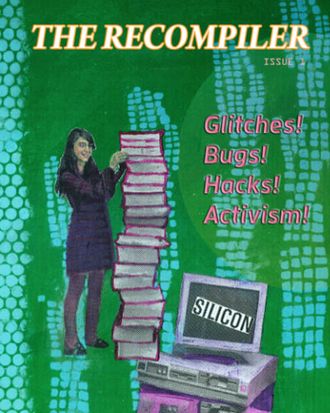
On Tuesday, the very first issue of The Recompiler — the self-described feminist hacker zine — premiered online for all your technological interests and gadget-based needs. Its contributors vary in how they cover the evolution and use of technology (there are explainers, personal essays, how-tos, and reporting), but The Recompiler is best digested as a whole anyway. Are you a woman who codes, a feminist who hacks — or do you have a faint interest in either? There are stories a-plenty to satisfy. A piece called “Computers, Programs, and Wrestling With Infinity” is printed alongside a personal essay on growing up with gadgets, a how-to guide on building a text-based video game, and an editor’s note that proclaims The Recompiler will feature “‘what’s in your bag?’ taken to a whole new level of detail.” The results so far appeal to the technophile and technophobe alike, and they’re just getting started.
The Cut caught up with editor-in-chief Audrey Eschright over email to see if anyone who wants to be can be a feminist hacker.
Let’s say I know nothing about hacking or technology (true!), how would you explain what exactly The Recompiler is and why I should read it? What would a “laywoman” get out of The Recompiler?
The Recompiler is intended for a technical audience — I tell contributors to expect that the reader has some experience with programming but doesn’t consider themself “advanced” or an expert. That said, my goal is that anyone who wants to learn more about technology will be able to get something out of this, and that the material will be as approachable as possible. Many of the articles are as much about what we build and why we build it, as the specific code required.
[Note: The Cut found this piece on bad metaphors in teaching programming to be especially digestible.]
Is the intent to specifically teach women about technology, or is it for anyone who is interested? Why call it “feminist”?
The magazine is intended for everyone. Feminist is often taken to mean “for women” — and I am interested in how technology is coded feminine or masculine. But my focus is more on feminism as a tool for understanding inequality and oppression. For the magazine, that means we pay writers for their work, we work to include different kinds of voices and highlight what they’re building, and we examine how these topics can be taught in a more inclusive, participatory way.
Why is it important that women are aware of and involved in issues regarding the web?
Technology mediates so much of our everyday life now. Really, we all have a stake in understanding how it works. The problem is, we’ve had decades of marketing that tell us that only a certain slice of the population should learn to do this, and the tech industry echoes and perpetuates that. Whether tech is a good career path for women is a really complicated thing to answer, but I think we all benefit from a better understanding of how technology works, and the ability to build tools that reflect our interests and needs.
Why the physical copy of the zine as well as the digital? What’s the incentive to have a physical component?
It’s a bit of an homage to 2600 and other hacker zines. Working with print is really fun and satisfying for me, also. And I find that people respond to it in a different way, it’s something you can read and pass around, the tactile experience is very compelling.
The Recompiler features a Contributor Code of Conduct. Where did you get this idea?
I want the practice of inclusion to be really explicit, and one of the ways we can do that is by having a stated code of conduct. Teaching people how to use policies effectively is also what I work on when I’m not producing the magazine or working on open-source software.
What’s your take on the Girls Who Code movement?
The interest on teaching programming to a wider audience is really great. Have you heard about Hack the Hood? They work directly with low-income youth of color, teaching technical and business skills.
Do you have any dream contributors for the zine?
Swift on Security, definitely.
This interview has been condensed and edited.




